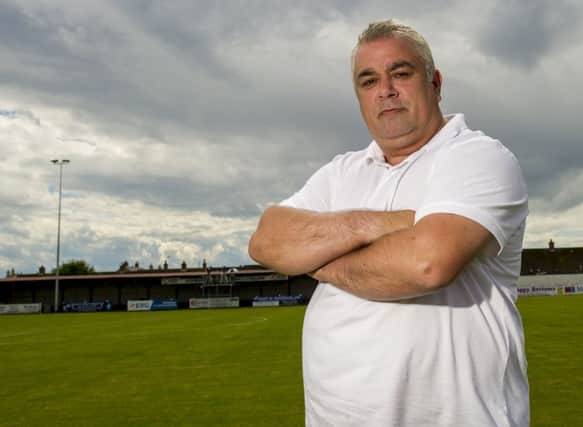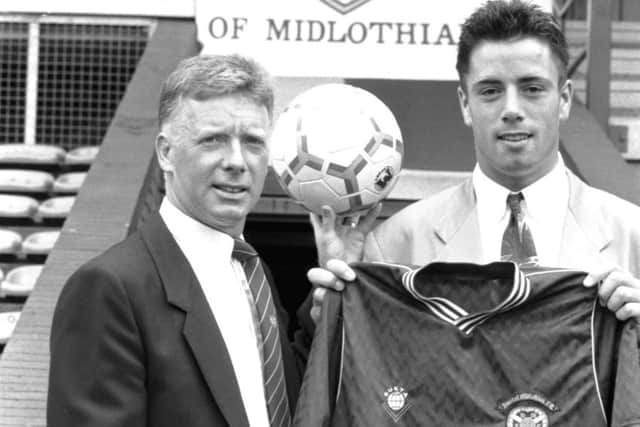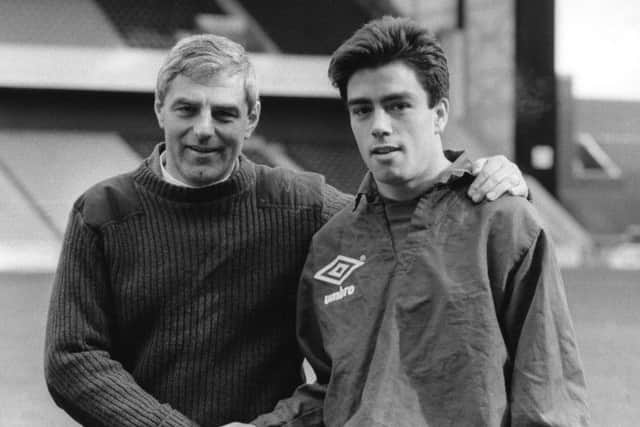Interview: Brora Rangers manager Davie Kirkwood


But what of Scotland’s pyramid, a monument to the work of the pharaoh of our phootball, Stewart Regan? Well, there are myths surrounding this one, too. We all thought Brora Rangers away up in Sutherland viewed elevation to the senior game as some kind of entombment. The problems were to do with finance and the distances the Highland League champions would have to travel: that epic journeys to Berwick and Annan would leave them knackered, disillusioned and bust. Some cynics may also have reckoned they detected in Brora a distinct lack of guts.
Elevation is still very much hypothetical. Brora will have to overcome Edinburgh City, whom they meet in the first leg of their Highland/Lowland play-off today, and then Montrose, the bottomest of the bottom in League 2, to gain an invitation. But if the club’s hierarchy are seriously reluctant to accept it, then Davie Kirkwood would seem to be the wrong guy up the front of the bus heading down to Meadowbank.
Advertisement
Hide AdAdvertisement
Hide AdThe Brora manager has just steered his team through an unbeaten season. Theirs may be a small world, couthie clubs in often VistaVision settings, but they’re its Invincibles. We’re in an Inverness coffee-shop, Kirkwood joking that this is as far as I was prepared to venture into the interior to meet him, Brora being another 57 miles north, and I ask when they came closest to losing. He thinks for a long time. “Probably away to Fraserburgh. They sussed us out and we ended up drawing 1-1. They were the only team to beat us the previous season – and by the way, that result still niggles me.”


The 47-year-old Kirkwood’s only concern, always, is to win the football match. This is what’s said about all football men, of course, but in his case, given the rumours about Brora’s supposed stubbornness, it’s worth emphasising. As a teenager at Rangers he played under Graeme Souness. His career as a midfielder was cut short by a horrific knee injury. Oh, and he hails from Fife. These things tend to have an influence and can help shape a driven, no-nonsense attitude. Especially when confronted by the nonsense that Brora might not be trying too hard this afternoon.
The boss at Dudgeon Park reacts with high dudgeon: “Not a chance – never in a million years,” he says. “If anyone suspected my players of that then, honestly – watch out. It’s just not going to happen. I think some of what was said on behalf of our club previously [about the pyramid system] was taken out of context. Our chairman John Young was simply asking for clarity on the finance side. That’s his job and he does it well. My job is on the football side and if I wasn’t winning games, trying to win every game, then I wouldn’t be doing that job anymore and some of the players would be out the door, too.
“I’m ambitious and so are the players. In football, you’ve got to keep challenging and testing yourself otherwise you’ll coast and stagnate.” This makes little Brora sound like sharks, never sleeping. “Winning is ingrained in footballers,” he continues. “Listen, in 68 games we’ve only been beaten once. Are we going to throw all of that away because of the play-offs? Absolutely not.”
A son of Methil, Kirkwood has filled out somewhat since his own playing days. He always wanted to be a footballer and got his chance with the town team, East Fife, at the age of 16 while still at school. “My dad played for the RAF when he did National Service in Cyprus – he was forever telling me how great he was – and my uncles were players, too.” First game, he scored the winning goal against Albion Rovers with his first touch of the ball, which presumably must have made him a playground celebrity back at Kirkland High the following Monday.


“Well, the school were good at keeping my feet on the ground. When I was playing for Scotland Under-15s in Switzerland they sent two teachers over with me so I could sit my techy drawing exam at exactly the same time as my classmates. The senior East Fife players weren’t going to let me get too big-headed either. The big night out locally was the Beach Hotel disco but there was no way they would have let me swan in there under-age when I hadn’t achieved anything in the game – even with my New Romantic haircut. That would have been impossible anyway.
“The Beach was actually the only night out. Our manager, Dave Clarke, had the bouncers under strict orders to report any shenanigans back to him. And in any case I think my two big sisters would have clyped on me.”
There was a famous 1984 Scottish Cup win over Hibernian, with Kirkwood impressed by Clarke’s managerial cunning. “He noticed Alan Rough was hurt – it turned out he’d broken his ankle – and wasn’t coming off his line and so got us to exploit this with through balls.” Two years later brought a gallant League Cup defeat by Rangers after extra time and penalties, local legend having it that Kirkwood was on the receiving end of an admiring wink from Souness after the Ibrox club had squeezed through on penalties. “I remember it. And a few months later, when I was at Fife College studying electronic engineering, some press guys came to the door: ‘What do you have to say about signing for Rangers?’ That was the first I’d heard about it.”
Advertisement
Hide AdAdvertisement
Hide AdKirkwood had to stop off in Kirkcaldy and buy a suit, and chop an inch off that hair, to comply with Rangers rules. Souness as an opponent had been “just another player” but now our boy, aged 19, was in awe of him. “Suddenly this world-class player, all those European Cups, was my boss. He had a tremendous aura.” Souness’s methods were radical. “At East Fife, the pre-match meal had been lunchtime on the day of the game, rushing down a bowl of soup, a steak and some toast. At Rangers on the Friday night in a smart hotel it would be a bowl of pasta and a glass of wine – the Italian way, I guess. Another thing Souness brought from Sampdoria was his stretching – 45 minutes of it before kick-off without ever touching a ball.”
Kirkwood lists his managers, thinks about what he might have learned from them. “When Walter Smith said you’d played shit that was indeed the case. At Hearts where I went next, Alex MacDonald was a tyrant on fitness, the running track and the speedball, but Joe Jordan who came after him was interesting because he would shape a team, something I suppose they felt they didn’t need to do at Rangers with all these superstars. At Airdrie, Jimmy Bone was quite off-the-cuff but funnily enough not with warm-ups: they had to be regimented and I hated that. Jimmy Nicholl at Raith was a great manager but the best thing about him was his laughter, his sense of fun.”
Was the Rangers revolution in any way instructive for the Brora Rangers revolution when Kirkwood switched from Wick Academy? “Well, there was a world of difference between them, but the first thing Souness did was address the spine of his team with himself, Chris Woods, Terry Butcher and Colin West and maybe I did something similar by building my team round Joe Malin, Ross Tokely, Richie Hart and Steven MacKay.”
Back to his own playing days, with Kirkwood’s Gers debut coming two days after a Butcher header at Aberdeen had clinched the Premier League. “It was the Glasgow Cup final against Celtic, Peter Latchford’s last game for them, and 25,000 sounding like 125,000.” There was even more mayhem in the following season’s European Cup away to Dynamo Kiev: “80,000 folk, total, total noise, everyone against you.
“Rangers were 1-0 down going into the home leg and that was when Souness reduced the width of the pitch to try and nullify their wingers. Their ’keeper threw the ball, it bounced off the centre-half’s head and Mark Falco scored with a tap-in – and then Ally McCoist got the winner with a lucky header.” Kirkwood was a sub in both matches – was he nervous? “No, I was excited, just dying to get on, and the first thing I did was hoof Oleg Blokhin up in the air. Games of football never got me nervous. I’ve always been much more worried about making an idiot of myself in front of my kids.”
These ties were the undoubted highlights of a brief and often bewildering stay in Govan during which he was moved to right-back and reassured he had a future at the club, only to bump into the latest glamour recruit, Gary Stevens. “I thought: ‘Where’s he going to play?’ The answer was just in front of me. Celtic had just won the title in their centenary season so there would be another clearing of the decks.”
Kirkwood mostly figured in the reserves. With Ian Durrant and John Spencer, he was part of a junior branch of the semi-legendary Ibrox drinking club. “Our favourite place for a wee outing was the Duck Bay Hotel at Loch Lomond but that required five weeks of planning and some poor guy agreeing to be the designated driver.” He was disappointed he didn’t manage more than a handful of appearances for the first team, but adds: “That was probably down to me. If you take things for granted it’ll come back and bite you on the backside. You’ll get dropped and fall out of the picture. That was a valuable lesson, learned the hard way. I’m sure it made me all the more determined to succeed later. But Ibrox was an education – literally. I learned off so many great guys it was like I was back at college, but without the need for any paperwork. Before I met Ray Wilkins everyone had told me not to try and pass right across the pitch. Butch’s advice was: ‘Do it – it’ll boost your confidence’.”
His best-ever goal? “That was maybe for Raith away to Ayr. Stevie Crawford crossed early and I lost the ball in the sun, so I shut my eyes and took a swing and it whizzed into the top corner. Somerset Park was a lucky ground for me until the following season when I got my injury. My right knee was shattered and I was out for two years. The surgeon at Murrayfield Hospital, Malcolm Macnicol, told me: ‘You’ve got two choices. I can patch you up and you might play for another couple of seasons but then you’ll need a walking stick for the rest of your life. Or you could start to think about coaching’.”
Advertisement
Hide AdAdvertisement
Hide AdYou never know in football. Kirkwood didn’t know he would become a Ranger, or that management would present itself as his best, indeed only, option. As an East Fife man he couldn’t have contemplated ending up at Stark’s Park. But Raith provided him with plenty of thrills, including the Coca Cola Cup triumph of 1994 – “I’d got injured the previous week after falling into a pothole at Central Park, but I was in tears watching the boys win it.” He was fit to play against Bayern Munich, though, when Rovers fans briefly thought they might be dancing in the forests of Bavaria. And when Jimmy Nick asked him to strap himself up for five games to save the club from relegation he obliged then hung up his boots.
The coaching life took him from Raith to Motherwell and then Rangers before he was invited to take charge of youth development at Ross County. “My son Chris was sitting exams at school so the move up here had to be right for him, my wife Julie and our daughter Becky. I knew I’d be fine up here coming from Fife. I knew about being by the sea, caravan parks and golf courses. Julie’s from Glasgow and that’s all the kids had known. But everyone fell in love with the Highlands right away.” The family live on the Black Isle. There’s a beach at the bottom of the road but, unlike Leven, no disco, which is probably just as well, given the state of Kirkwood’s knee. “It’s like a little bit of Spain, with dolphins playing in the water and beautiful views across to Castle Stuart and Fort George. The pace is laid-back and everyone’s friendly.”
They weren’t too friendly up in Wick when he quit for Brora three years ago. His journey to training was drastically reduced but there was another attraction, another challenge: with the help of oil millionaire Ben Mackay, Brora were aiming to create champions. Bring us the title within three years, they told Kirkwood. He’s won them two.
Brora is just a village. From a population of just 1100, crowds of between 300 and 400 are more than respectable. The old quarry is pretty notable, having supplied stone for London Bridge and Liverpool Cathedral, although presumably it wasn’t dragged all the way, because neither was the pyramid limestone in Egypt.
Via football’s pyramid, Kirkwood wants to show off the team he has helped build to an audience beyond the Highlands. The longer journeys will mean more opportunity for his players to use him as an agony aunt. “I’m like the ‘Dear Deidrie’ column – I get all their personal problems,” he laughs. “I must admit I’m a terrible passenger, especially on the bus, so maybe I’ll have to start driving it. But if we get through the play-offs, at least we’ll be off the single-track roads. Then maybe I won’t have to ask the chairman to grab me some sick bags, as happened less than half an hour down the road to Turriff the other week.”